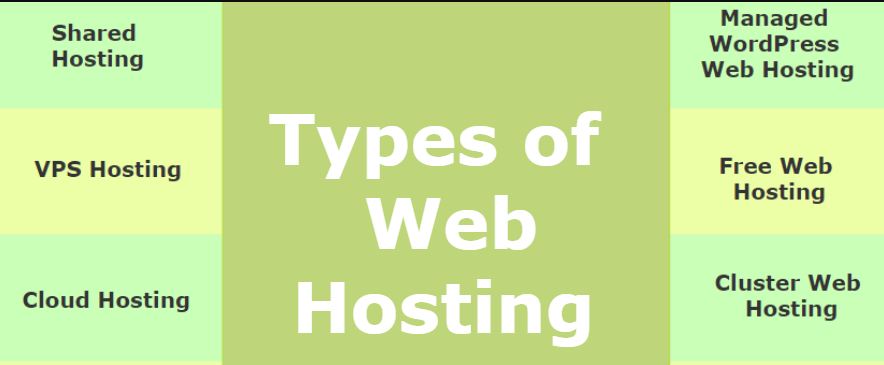Different Types of Web Hosting & Their Key Features

Most of us log on to the internet, open a browser and visit our favorite websites. But we never try to understand what a website really is leave alone what a hosting company does.
So let us begin with the website basics.
It is simply a collection of World Wide Web files that opens with a home page. The word “site” may confuse you because it denotes a location. You may think it is a web server. It is not. Web server is a program that serves files that form web pages to users
Actually a large website can be spread over many servers at various locations.
A better way to describe a website is to use the term “web presence”. A web presence denotes a location where an individual, business, or any other entity is represented to allow visitors get to know various information and graphics displayed.
A website is loosely a grouping of documents/pages, web application and content management systems.
In order to run a website, you need a computer and an internet connection. The internet receives requests from the user, takes action and responds.
For individual performing personal tasks, a PC is more than enough.
However, for an entrepreneur or a business, a bigger, faster and better computer is needed.
This in simple terms is a server.
Purchasing, operating and maintaining a server can be a very expensive affair, even for businesspersons.
Webhosting companies have solved this problem for you. They have huge infrastructure installed to put up clients’ websites with fast internet connections.
So, remember, when you use a web hosting company or a web host, your files will be located on a real computer in a bona fide building.
Now the next question is how to purchase a web hosting plan.
It would not surprise if you are overwhelmed by the different types of web hosting plans in the market.
To make matters clear here is a rundown on 5 different types of hosting.
Shared Hosting
This is the most prevalent type, and also the cheapest.
With shared hosting, numerous customers share one server or computer. All the websites of different entities or accounts are stored and delivered by the same server.
Since the server has to take the load of numerous accounts, it has to be a large one and much more powerful than a personal computer.
Today’s shared hosting vendors host hundreds of websites without causing any problems to their clients. If your website is for a blog, or to simple make your presence visible with a few articles and images, then shared hosting will do the job for you.
But if you are going to run an intricate CMS or content management system on a site that is drawing good amount of traffic, shared hosting will have limitations. You may experience performance issues and downtimes, and most importantly limitations on resources like bandwidth and processing power.
The better option in this case is to go for a Virtual Private Server or VPS.
Virtual Private Server or VPS
VPS is a virtualized hosting environment that mimics an exclusive server within a shared hosting environment.
To make things clear, with an exclusive virtual server you get complete control over the processes as you would with a dedicated server (explained later in this article).
With VPS hosting you will be able to use more server resources and have better control over the hosting environment.
The benefits that you get include:
- Privacy – Since you do not share your operating system with anyone else, other entities or accounts cannot access your files. Virtualization also means you are shielded from any issues that may arise on other sites.
- Customization – VPS hosting enables an exclusive server allowing you to operate applications such as PHP and MySQL, plus you can make alterations as required.
- Exclusive resources – On a VPS server, you will get specified and dedicated amount of RAM exclusively for your use. With cPanel you can upload files, manage domains, and perform various other tasks without any difficulty.
The main drawback of this type of hosting is the price. It is more expensive than shared hosting. But if your business needs an upgrade, then the extra bucks you shell out is worth the investment.
A time may however arise, when you need more processing power, more control and resources.
In this case you have to choose a dedicated server hosting.
Dedicated Server hosting
This type of hosting is the preferred type by small, medium and large enterprises. Simply put, a dedicated server is a machine with all its hardware and software resources at your exclusive disposal.
In addition, most providers offer exclusive features such as server management, backup servers and customized technical support.
This is the most expensive type, and hence chosen by only those who need a high level of performance, excellent security and industry standard uptime.
Cloud hosting
The problem with all the three described earlier is they have physical limitations of the actual server. Because of this aspect, hosting companies are now offering another option – cloud hosting.
Cloud simply means a large number of computers all clustered together. Any application running on them makes use of the combined resources of all.
This type is the new trend, because it offers scalability and “pay for what you use” advantage.
Choosing the right hosting plan and the right service is an important but unenviable task. You must correctly evaluate your hosting needs and various pricing models. But once you choose the appropriate plan, you are on a smooth ride.





